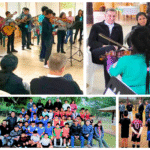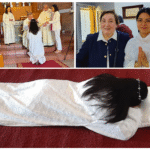.
By F. Luis Casasus, General Superior of Idente missionaries
Commentary on the Sunday Gospel of 3-12-2017, First Sunday of Advent (Book of Isaiah 63:16b-17.19b.64:2b-7; 1 Corinthians 1:3-9; Saint Mark 13:33-37).
Most of us have experienced getting a notification on our phone while we are talking to someone. Did you sneak a look at your phone to see what it was?
Probably. This is just a small symptom of a much larger problem, which is called Continuous Partial Attention. We are so heavily bombarded with information and stimuli, that we hardly give continuous full attention to anything. Instead, we try to do everything at once, giving the various people or tasks that require our focus, just a portion of our attention, which is spread thing over other tasks as well. In fact, that useful and little phone in your hand works very much like a drug, calling your attention it time and time again.
The more dangerous effects of Continuous Partial Attention, however, are on relationships. The formation of authentic and healthy relationships that last requires effort, time, and careful attention.
I was sharing something personal with a friend, and he abruptly interrupted me to talk to another person. I felt shocked, but I also realized that I had just seen myself in his distracted face. My friend’s inability to focus on what I was saying helped me to realize that my attention on others is often unfocused, too. This incident helped me to see in a very concrete way the connection between my undisciplined attention and my failure to love others and God.
One of the major challenges in our prayer life is the wandering of our mind. How can one expect to be in relationship with another person when your mind is not focused on the conversation with them? And how much more important this is with God. This is surely taking the Lord’s name in vane when we let our minds wander while calling out to him for help and forgiveness.
Imagination is used by the devil as one of his most cunning weapons; imagining good works, imagining bad ones. Various thoughts come and preoccupy the soul, so that it ceases to think under the light of of Jesus. He tries to make man not to show interest in God and express his love. Primarily he coaxes him to call to mind of the various faults he has committed in his former and recent life.
It is in our mind that we are most easily led into sin. Therefore God is advising us in this directive to focus on our most vulnerable area much like a physician will give us preventative advice on that aspect of our heath that is the weakest. So why is the mind that area of our greatest weakness? It is because it acts by itself; it acts quickly and effortlessly, and is active at any time or situation. Therefore, it is much easier to sin in the mind than through actions of our body. Action in the body takes time and effort as well as the interaction with others. In fact, you can be acting in a virtuous manner while at the very same time your mind is involved in numerous sinful thoughts. There is no witness to sins that take place in our mind and no one to correct us. It is therefore most important to be attentive to the action of our mind.
There is a cumulative effect to our attentiveness…or the lack of it. In the parable of the Sower, seed that is scattered on the path does not remain there waiting for another day. As the text says, the birds came and ate it up. Not paying attention to what is important has consequences.
At the cross, in spite of his own situation, Christ gave his Continuous and Complete Attention to you and your salvation: Father, forgive them, for they do not know what they are doing. (Luke 23:34).
In Matthew’s account of Jesus’ ministry, Jesus teaches about prayer and instructs his followers: Go into your room, close the door and pray to your father, who is unseen. Then your father, who sees what is done in secret, will reward you (Mt. 6:6).
There is an essay by French philosopher and mystic Simone Weil in which she writes: Prayer consists of attention. After I read that sentence, I felt a shiver of shock run through me. If prayer is truly connected to our ability to pay attention, the implications are startling and immense, especially in today’s multi-tasking, fast moving, digital culture. Without learning how to pay attention, our lives become more and more fractured and distracted.
Jesus goes off very early in the morning to a solitary place to pray, which is an act of sustained attention (Mark 1:35). Peter and the disciples hunt him down and interrupt him, trying to distract him with what the crowd wants. Jesus switches their attention back to what really matters and says: Let us go somewhere else, to the nearby villages, so that I can preach there also. That is why I have come (Mark 1:38).
But the human ability to pay attention is surprisingly limited. Its capacity is estimated at 120 bits per second. In practical terms, this means you can barely understand two people talking to you at the same time. It seems we have been made to focus on one person at a time. This is an example of our limitations and weaknesses, in spite of our goodwill and honest ascetical efforts. Every teacher has experienced how easily students fall asleep when you passionately explain the most exciting and important topic of your subject matter.
However, we cannot forget the mystical dimension of attention: This Continuous and Complete Attention is a gift, with a defined objective. We all have experience of this free gift, as a response to our ascetical effort, in the Mystical Recollection. In the words of our father Founder:
The canon or constant of mystical recollection is the existence in the mind of a habitual attention towards holiness with the Divinity as its subject. This constant of the unitive state of the mind is characterized by the openness, trust, surrender to God, that makes it possible for the Holy Spirit to be infusing the progressive understanding of divine truths; that is, that intelligence far from the fixation of the mind in recreating or saving something supposedly religious, have the true disposition toward the divine in a continuous manner, with the intention of thinking, feeling, remembering always the most truthful, the most good, the most beautiful of our mystical filiation (Mystical Conception of Anthropology).
As Thomas Merton says: The Spiritual life is first of all a matter of keeping awake. Our father Founder expressed it still more clearly: Sanctity is a progress in our filial consciousness, which is not only attention, not only fruition, but a gradual nearness of Christ: I am here at the door calling; if someone hears my voice and opens the door, I will enter into their home and eat, I near him and he near me (Rev 3:20). This is our true awareness and our genuine consciousness. We can say today with Isaiah: O Lord, you are our Father; we are the clay and you the potter: we are all the work of your hands.
Today we begin a new liturgical year. The gospel reminds us that we have been entrusted with the responsibility to look after our own lives and that of others. Furthermore, there will also be a time of reckoning, when we are called to give an account of the way we live our lives.
Advent simply means the coming of the Lord. It is an opportune moment to be aware of His first coming at Christmas so that His presence can also be with us throughout the year, offering us strength, vision and life.
However, many of us are blind to His coming. This is the gist of the first reading. Most of us are asleep, like the servant placed in charge of the household. This unawareness of God’s presence is the result of us falling into the rut of habit and deadly routine. We get used to things; like the servant who got used to the authority entrusted to him and became indifferent to his responsibility. Many of us have fallen into the habit of being Christians, missionaries, the routine of Mass and Exam of Perfection.
Gratitude is an antidote against routine and a powerful tool to be aware of the active presence of God permeating every single moment of every single day. Saint Paul tells the Christians of Corinth in today’s Second Reading, rejoicing that Jesus has already come and what it means for our daily lives: I never stop thanking God for all the graces you have received through Jesus Christ. I thank him that you have been enriched in so many ways.
We too can thank God for all that Jesus has brought and continues to bring into our lives, the countless helps he gives us to lead a good life. We do that best by constantly being aware of his presence and action in the people around us. We are helped by so many people, most of whom we do not know, have never seen.
For instance, just think of all the people who, by their labors, make available the food we will have this day. We should thank God for all that he does through so many unknown brothers and sisters. Every time we drink a cup of coffee, think of the huge number of people, many of them working under oppressive conditions, who have brought that lovely taste and lovely aroma into my life. How often do I thank God? How often do I thank them? For through them God’s love and care come into my life. And how much more do I have to thank for the gift of Faith received from the Holy Spirit through relatives, friends, enemies and nature.
It is the little acts of love and joys that we experience each day that enable us to deeply enter into the meaning of God giving us His only Son, which we celebrate at Christmas, in the manger among the poor. Jesus comes every moment and every time when we experience joy, loving, giving and sharing. And also when we face a virtually impossible mission and we realize that it is an act of divine confidence towards a weak creature.
The certainty of the return of Christ has a purifying effect on us. Fixing our hope on Him causes us to reflect on our lives and to establish and carry out His priorities. Christ is on His way; He wants us to be ready.
The message of the return of Christ offered hope to the fisrst-century believers, especially during times of persecution. The inspired words of Paul to the church of Thessalonica continue to encourage us with a strong affirmation: We do not want you to be unaware, brothers, about those who have fallen asleep, so that you may not grieve like the rest, who have no hope For if we believe that Jesus died and rose, so too will God, through Jesus, bring with him those who have fallen asleep. One cannot overlook the notes of victory and hope contained in these words. Because of the death of Christ on the cross and his Resurrection, Paul considered death to have been conquered so thoroughly that death can be called “sleep” and conquered so finally that the whole nature of grieving is changed.
Advent calls us to shake off the dust of routine, habit, custom and to let Christ come alive in our lives once more.











